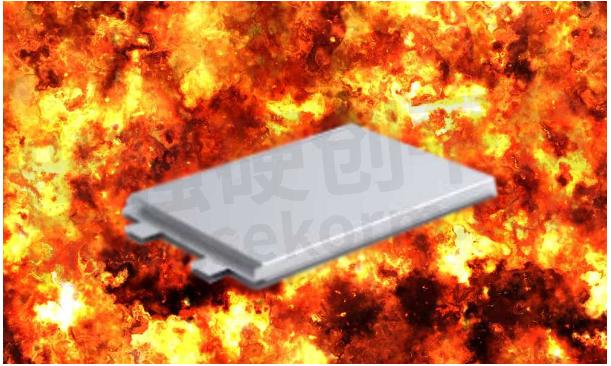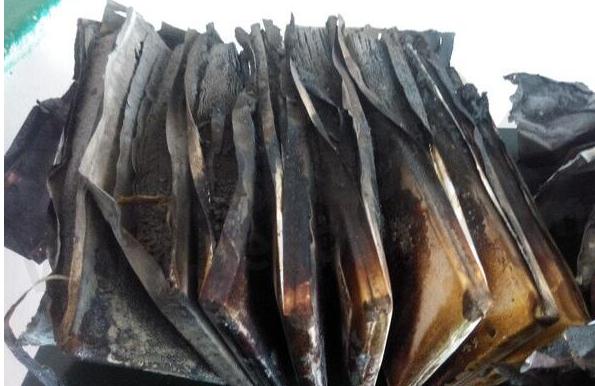What Caused The Lithium Battery to Explode?




The type of battery core explosion can be summarized as an external short circuit, internal short circuit, and overcharge. The external part here refers to the outside of the battery cell and includes a short circuit caused by poor insulation design inside the battery pack.
The characteristics of lithium
Lithium is the smallest and most active metal on the chemical periodic table. Small in size and high in capacity density, it is widely welcomed by consumers and engineers. However, the chemical properties are too active and pose a very high risk. When exposed to air, lithium metal can explode with intense oxidation of oxygen. In order to improve safety and voltage, scientists have invented materials such as graphite and lithium cobalt oxide to store lithium atoms. The molecular structure of these materials forms a nanoscale storage grid that can be used to store lithium atoms. In this way, even if the battery casing is broken and oxygen enters, the oxygen molecules are too large to enter these fine cells, so that the lithium atoms do not come into contact with oxygen to avoid an explosion. This principle of lithium-ion batteries allows people to achieve high-density density while achieving safety. When a lithium-ion battery is charged, the lithium atom of the positive electrode loses electrons and oxidizes to lithium ions. Lithium ions swim through the electrolyte to the negative electrode, enter the cell of the negative electrode, and obtain an electron, which is reduced to a lithium atom. When discharging, the entire program is reversed. In order to prevent the battery from being short-circuited by direct contact between the positive and negative terminals, a separator paper with a large number of fine holes is added to the battery to prevent short circuits. Good diaphragm paper can also automatically close the pores when the battery temperature is too high so that lithium ions can not pass through and prevent danger.

Fig.1
Protective measuresCharging voltage upper limit
Lithium Battery cells will begin to produce side effects when they are overcharged to a voltage higher than 4.2V. The higher the overcharge voltage, the higher the risk. After the lithium battery voltage is higher than 4.2V, the amount of lithium atoms remaining in the positive electrode material is less than half. At this time, the storage cell often collapses, causing a permanent drop in battery capacity. If the charging continues, since the cell of the negative electrode is already filled with lithium atoms, the subsequent lithium metal will accumulate on the surface of the negative electrode material. These lithium atoms grow dendrites from the surface of the negative electrode toward the direction of lithium ions. These lithium metal crystals pass through the separator paper, shorting the positive and negative electrodes. Sometimes the battery explodes before the short circuit occurs. This is because, during the overcharging process, the electrolyte and other materials will crack and generate gas, causing the battery casing or pressure valve to bulge and rupture, allowing oxygen to enter and react with the lithium atoms deposited on the surface of the negative electrode. Then exploded. Therefore, when charging a lithium battery, you must set the upper voltage limit to take into account the battery life, capacity, and safety. The optimal charging voltage is limited to 4.2V.
The lower limit of discharge voltage
Lithium batteries should also have a lower voltage limit when discharging. When the cell voltage is lower than 2.4V, some materials will start to be destroyed. Since the battery will self-discharge, the voltage will be lower for a longer time. Therefore, it is best not to put it at 2.4V to stop. During the period from the discharge of 3.0V to 2.4V, the energy released by the lithium battery is only about 3% of the battery capacity. Therefore, 3.0V is an ideal discharge cutoff voltage.
Current limit
In charge and discharge, in addition to the voltage limit, the current limitation is also necessary. When the current is too large, lithium ions cannot enter the cell and will accumulate on the surface of the material. When these lithium ions obtain electrons, crystals of lithium atoms are generated on the surface of the material, which is dangerous as overcharge. In the event of a broken battery case, it will explode. Therefore, the protection of the lithium-ion battery must include at least three factors: the upper limit of the charging voltage, the lower limit of the discharging voltage, and the upper limit of the current. In the general lithium battery pack, in addition to the lithium battery core, there will be a protective board, which is mainly to provide these three protections. However, these three protections of the protection board are obviously not enough, and the global lithium battery explosion is still frequent. To ensure the safety of the battery system, a more careful analysis of the cause of the battery explosion must be performed.
Cause of battery explosion
1. Internal polarization is large. 2. The pole piece absorbs water and reacts with the electrolyte to form an air drum. 3, The quality of the electrolyte itself, performance issues. 4. The amount of liquid injection during the injection is not up to the process requirements. 5. The laser welding and welding sealing performance are poor in the assembly process, and the air leakage and leak detection are leaky. 6. Dust, extreme film dust is easy to lead to the micro-short circuit, the specific reasons are unknown. 7. The positive and negative electrodes are thicker than the process range, and it is difficult to enter the shell. 8, The problem of liquid injection sealing, steel ball sealing performance is not good, resulting in an air drum. 9. The shell material has a thick shell wall, and the shell deformation affects the thickness.

Fig.2
Explosion type analysis
The type of battery core explosion can be summarized as an external short circuit, internal short circuit, and overcharge. The external part here refers to the outside of the battery cell and includes a short circuit caused by poor insulation design inside the battery pack.
External short circuit
When a short circuit occurs outside the cell, and the electronic component fails to cut off the circuit, high heat is generated inside the cell, causing some of the electrolyte to vaporize and the battery case is enlarged. When the internal temperature of the battery is as high as 135 degrees Celsius, the good quality diaphragm paper will close the pores, the electrochemical reaction will terminate or nearly terminate, the current will drop suddenly, and the temperature will slowly drop, thus avoiding the explosion. However, the pore closing rate is too poor, or the separator paper, which does not close the pores at all, will cause the battery temperature to continue to rise, more electrolyte vaporizes, and finally, the battery casing is broken, and the battery temperature is raised even to The material burns and explodes.
Internal short circuit
The internal short circuit is mainly caused by the burr of the copper foil and the aluminum foil piercing the diaphragm, or the dendrite of lithium atoms piercing the diaphragm. These tiny needle-like metals can cause micro short circuits. Since the needle is very thin and has a certain resistance value, the current is not necessarily large. Copper and aluminum foil burrs are caused during the production process. The observed phenomenon is that the battery leaks too quickly, and most of them can be screened by the battery factory or assembly plant. Moreover, since the burrs are small, they are sometimes blown off, so that the battery returns to normal. Therefore, the probability of an explosion caused by a burr micro-short circuit is not high.
Overcharge
In this way, it is possible to get a bad battery with a low voltage shortly after charging in each battery factory, but there are few explosion events and statistical support. Therefore, the explosion caused by the internal short circuit is mainly caused by overcharge. Because, after overcharging, the lenticular lithium metal crystals are everywhere on the pole piece, and the piercing point is everywhere, and micro short circuits occur everywhere. Therefore, the battery temperature will gradually increase, and finally, the high temperature will be the electrolyte gas. In this case, whether the temperature is too high, the material burns and explodes, or the outer casing is broken first, these are explosions caused by overcharging. Although the lithium battery will fail sometimes, it's still a kind of safe and mature technology and because of that, when the battery suddenly exploded, it will become the news, which also shows significant failure is how rare battery manufacturers to prevent battery failure, installed a large number of protective measures, or at least reduce the fault caused by the damage.

Fig.3
To avoid the above problems, we need to choose safe batteries from reliable battery manufacturers. Grepow batteries meet the requirements of ROHS, CE, UL, UN38. 3, MSDS and other certifications. It is in compliance with international standards to ensure safety for all applications. With over 20 years of customer service experience, Grepow has developed a very complete service system, specifically tailored for Grepow customers, which helps Grepow in better understanding your needs in the first step of our communication, in a highly time-efficient way.
- |
- +1 赞 0
- 收藏
- 评论 0
本文由三年不鸣转载自Grepow Official Website,原文标题为:What Caused The Lithium Battery to Explode?,本站所有转载文章系出于传递更多信息之目的,且明确注明来源,不希望被转载的媒体或个人可与我们联系,我们将立即进行删除处理。
相关推荐
Can Lipo Battery Cells Be Shipped by Air?
With the widespread use of electronic products, batteries nowadays have become household items that we can see everywhere. The most commonly encountered type of battery is the lithium-ion battery.
NMC vs NCA Battery Cell: What’s the Difference?
Choosing between NMC and NCA battery cells depends on the specific requirements of the application. NMC cells offer a versatile and cost-effective solution with balanced energy and power characteristics, making them ideal for a wide range of uses from EVs to power tools. On the other hand, NCA cells provide higher energy density and longer cycle life, making them suitable for high-performance EVs, consumer electronics, and aerospace applications.
5 differences between capacity lithium battery and the power one
Grepow tells about the following 5 levels(composition materials, current size, discharge rate , voltage level, applied products) in order to be clearer about their battery categories and select the right power supply device for them.
Recycling and Regeneration of Lithium Batteries
Under the pursuit of economic and environmental protection, the production and demand of lithium batteries have grown in recent years. Decommissioned lithium batteries are known as high-grade mines, coupled with the price and mining of raw materials, so the recycling value is obvious.
Grepow Released GRP4013020 LiPo Battery 80mAh 3.7V for Bluetooth Headset
The bluetooth headset battery produced by Grepow company is lighter, safer, and has more power. It can be customized in various shapes and sizes to provide you with high-quality and mature bluetooth polymer lithium battery solutions!
What is the packaging technology of soft pack Li Ion battery?
Soft pack lithium-ion batteries are always found in consumer electronics, as UAV/drone batteries, and the high-performance batteries of RCs, for military, and automotive industries. This article talks about the packaging technology of soft pack Li Ion battery.
Bike Light Battery Solution - Grepow GRP8024037 3.7V 600mAh Lithium Battery
GREPOW Battery is happy to offer any lithium battery for you, based on your capacity, size and performance demand. Let us go to see the bike light battery solution.
5 Factors That Affect the Lithium Ion Battery Life
Grepow talks about 5 Factors That Affect the Lithium-Ion Battery Life.
Grepow Lithium Batteries for Automated Guided Vehicles (AGV)
GREPOW Custom AGV lithium batteries eliminate the headaches associated with lead-acid batteries. The automated guided vehicles that GREPOW develops are always tailored to your requirements in detail. Not only does this package include navigation and safety systems but energy management as well, of course. Please contact us for a quote that matches the required specifications.Lithium BatteryFirst of all, GREPOW provides you with the best lithium batteries.
What is a coin and button cell and how to read the common models
Compared with the disposable ones, the rechargeable lithium-ion button battery has become the mainstream due to proper prices or being environmentally friendly, and the development of lithium battery technology and the ever-changing electronic products, especially TWS headphones, electronic cigarettes, rechargeable car keys, rechargeable hearing aids, etc.
Lithium-ion Battery Cycle Life VS. Calendar Life VS. Shelf Life
Lithium-ion batteries have become an integral part of our daily lives, powering everything from smartphones to electric vehicles. As these batteries play a crucial role in various applications, understanding their life expectancy is essential. In this article, we will explore the concepts of cycle life, calendar life, and shelf life of lithium-ion batteries, shedding light on their individual characteristics and implications.
Thin Film Lithium-ion Battery Vs Lithium-ion Battery: What’s the Difference?
In the rapidly evolving world of battery technology, thin film lithium-ion batteries have emerged as a promising alternative to traditional lithium-ion batteries. These batteries, with their ultra-thin structure and solid-state electrolyte, offer distinct advantages in flexibility, safety, and application potential. This article delves into the fundamental differences between thin film lithium-ion battery and conventional lithium-ion battery, exploring their respective structures, manufacturing processes, and applications across various industries.
Top LiPo Battery Manufacturers You Can Trust
This paper introduces the key characteristics, routine applications, product characteristics and factors to be considered in customer battery selection of GrIP lithium battery products
What‘s The Cycling And Float Of a Lithium Battery?
Lithium batteries, with their high energy density and versatility, have become a staple in various applications, from portable electronics to electric vehicles. Understanding the concepts of cycling and float in the context of lithium batteries is crucial for optimizing their performance and longevity. Let‘s delve into what these terms mean and the considerations associated with them.
What are the Best Intelligent Lithium Battery Manufacturers in Shenzhen?- Grepow Battery
At one time, a survey by the Japan Economic Research Institute showed that Chinese battery manufacturers accounted for more than 60% of the global automotive lithium-ion battery market.
电子商城
现货市场
服务
可自由定制电池形状,锂离子聚合物/磷酸铁锂成分,放电倍率Max. 50C (持续放电倍率) / 150C (脉冲放电倍率),充电倍率:Max. 5,厚度可达0.5mm。
最小起订量: 5000 提交需求>









































































































































































































登录 | 立即注册
提交评论